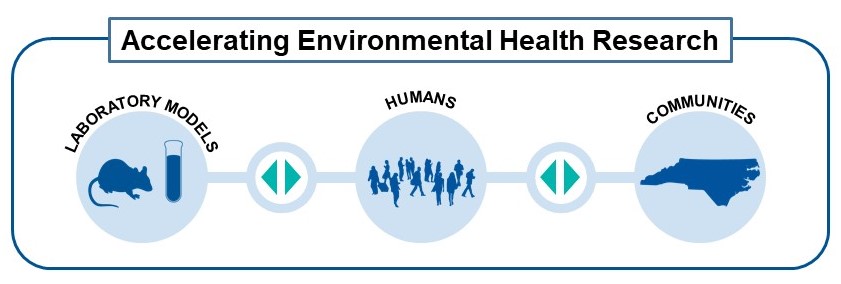Our Mission
The theme of the UNC Center for Environmental Health and Susceptibility (CEHS) is translating interdisciplinary research on environmental health susceptibility to improve public health in North Carolina. The state of North Carolina continues to be challenged by persistent mortality and morbidity rates, with high rates of cancer, asthma, lung disease, heart disease, Attention-deficit Hyperactivity Disorder (ADHD) and Autism Spectrum Disorders (ASD). As a central, university-wide hub for environmental susceptibility research at UNC for more than 20 years, the CEHS includes members from all five schools of allied health on campus: Medicine, Pharmacy, Nursing, Dentistry, and Public Health, as well as the College of Arts and Sciences. This interdisciplinary research base delivers high impact and innovative contributions to the environmental health sciences, translating from laboratory models to humans to communities, for the benefit of North Carolina communities and the nation.
Guided by strategic planning, the goals of the CEHS are:
Goal 1. To facilitate translational research collaboration and engagement in three focus areas: Cardiopulmonary Disease, Developmental Disease, and Environmental Cancer. Promoting translation is the core identity of our center, which has had two decades of sustained research strengths in environmental susceptibility research. Our research base emphasizes exposures and outcomes of high priority across North Carolina.
Goal 2. To disseminate knowledge and technology across interdisciplinary groups of researchers in environmental susceptibility. CEHS leverages innovations in molecular methods, basic science, clinical research and data science in UNC’s rich interdisciplinary community.
Goal 3. To recruit and train the next generation environmental health sciences workforce and its leaders in environmental health research and translation. CEHS supports the environmental health sciences workforce pipeline, nationally and in North Carolina, through our training mission, commitments to diversity, and our accomplishments in fostering career growth and development.
Goal 4. To engage public health and community leaders in responding to emerging environmental health threats facing North Carolinians and the nation. Through a Stakeholder Advisory Board, integration of the Community Engagement Core (CEC) across functional units of the CEHS, and an outstanding CEC team, CEHS is translating research to communities and responding to the needs of North Carolina.
The goals of CEHS are well aligned with the three themes in the National Institutes for Environmental Health Sciences (NIEHS) strategic plan: Advancing Environmental Health Science, Promoting Translation, and Stewardship and Support. We align resources and activities with these goals through strategic planning, evaluation, and monitoring in the Administrative Core (with oversight by an Internal Advisory Committee, an External Advisory Board, and a community Stakeholder Advisory Board). We support outstanding scientific Facility Cores, a dynamic Pilot Project program with multiple mechanisms fit to a variety of needs, a wide range of well-attended training and career development activities, and a vital research base that, with the support of our CEC, understands and responds to environmental health concerns in North Carolina communities.


The Center is funded by the National Institute of Environmental Health Sciences (NIEHS) and uses the NIEHS Strategic Plan as a guide for approaching environmental health research, with emphasis on serving the needs of North Carolinians. Leveraging the extensive resources available at UNC Chapel Hill and in the CEHS Facility Cores, the Center seeks to address state needs for environmental health exposure and fundamental research across our three Research Focus Areas. The Career Development Program in CEHS provides training and education opportunities for all Center members and especially targets new investigators. Since our state has a diverse population, economically and ethnically/racially, addressing environmental Health Disparities is crucial in the research and outreach initiatives of the Center. Most central to the CEHS mission is using Translational Science to move environmental health research from laboratory models-to-humans-to-communities, responding to our state’s needs through multidirectional Communication and Engagement that is led by our Community Engagement Core.
In collaboration with the Community Engagement Core, CHES supports planning grants and projects focused on Environmental Health Disparities (EHD) and Environmental Justice (EJ) – investigations of health conditions that burden people experiencing poverty or people with lower incomes, and those with health disparities. These efforts build collaborations between UNC faculty members and community leaders and/or community-based organizations (CBO), conduct preliminary investigation into an EHD/EJ issue in a community, or build capacity within a community-based organization to conduct future research on an EHD/EJ issue.
